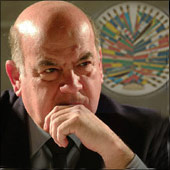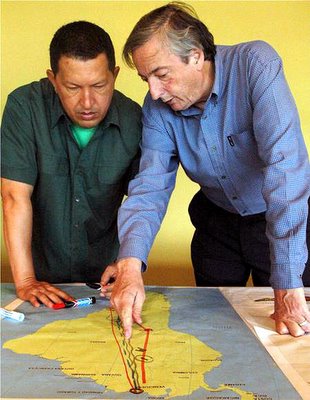Feb 24/06 - Insulza, Venezuela y la OEA: arando con los bueyes que hay
PMBComentario: El titulo de la nota de El Universal dice poco, pero los comentarios sin tapujo demuestran que José Miguel Insulza no será un actor de piedra, ni un precipitado, ante la polarización galopante que define y destruye a Venezuela. Acertado su comentario “es la responsabilidad de todos crear las condiciones para que todo el mundo pueda participar, e incluso unirse al proceso”. El gobierno de Venezuela ha sido intolerante con este y otro tipo de recomendaciones naturales de la OEA. Y el liderazgo partidista opositor Venezolano ha sido – hasta ayer - poco juicioso y consistente en lo de exigir condiciones que respeten los derechos de los electores. Son los actores políticos locales los que tiene la responsabilidad de asegurar que el proceso electoral cumpla con mínimos irrenunciables. A días de las elecciones parlamentarias, gobierno y oposición parecían dichosos de ir a un proceso al cual los electores ya habían dado la espalda. El retiro irresponsablemente tardío de la oposición no le costo tanto a estos partidos y “lideres” por la muy ensimismada actitud del gobierno de ignorar las consecuencias de medirse a solas en un juego que por definición es – y tiene que ser - plural.
La respuesta de Insulza a la pregunta sobre la intervención de Chávez en los asuntos electorales de otras naciones es definida como un "no" rotundo por la agencia noticiosa. Creo mas bien que debe de haber sido descrita como un "no" diplomático, pues decir "si" (rotunda ó tímidamente) - algo que estaría mas ajustado a la opinión in pectore de varios gobiernos afectados - tendría muy complejas implicaciones El llamado de Insulza a los Presidentes a vigilar sus propios procesos traslada el problema a la instancia adecuada. Serian ellos los llamados a denunciar formalmente ante la Organización la ingerencia de Chávez y tendrán ellos también que asumir las consecuencias de lo que el Secretario General llama "procesos anormales".
Denunciada formalmente la intervención, la OEA y su estructuralmente maniatado – mas no inválido - Secretario General, tendrán en sus manos la papa caliente. Ahí veríamos si el todopoderoso Embajador de St. Kitt y Nevis, por dar un ejemplo únicamente, entiende el porque - y el para que - de su estancia en Washington. Leyendo entre muchas líneas - y observando muchas intervenciones - no me queda duda que el "Panzer" chileno si entiende las circunstancias y las responsabilidades que conlleva el no siempre grato cargo que buscó y obtuvo de forma voluntaria. Cuando de la OEA se habla, no se le puede pedir peras al olmo - ni poner el arado por delante de los bueyes. PMB
Postdata: Insulza tiene la ventaja de contar con una magnifico manual de que NO hacer en Venezuela que le dejo ese ocioso admirador de lo "precioso" que fue Cesar Gaviria. Lanzarse voluntariosamente de tirabuzón en un problema que no entiende, con un equipo sin experiencia ó peso específico alguno, y no contar con un plan alguno de salida (plan B), no creo que sean errores que veremos a este SG cometer.
Insulza instó a la oposición a acudir a los comicios del 3D
El Universal, 24 de febrero de 2006
Nueva York. El secretario general de la Organización de Estados Americanos (OEA), José Miguel Insulza, tiene esperanzas de que los comicios presidenciales que se celebrarán este año en 4 de los cinco países de la región andina sean igual de pacíficos a los que tuvo Bolivia a finales de 2005.
"La democracia tiene problemas en la región, pero la OEA no espera que haya procesos anormales", dijo Insulza durante un debate sobre los países andinos en el Consejo de las Américas, reseñó AP.
Sobre Venezuela indicó que la gran pregunta es si la oposición participará en las elecciones de diciembre. "Será muy desafortunado si no hay una contienda electoral. Es responsabilidad de todos crear las condiciones para que todo el mundo pueda participar, e incluso unirse al proceso".
"El problema de Venezuela es difícil de manejar, porque se reduce al "No confío en ti... Alguien tendrá que llamar a alguien para que haya un diálogo", señaló e instó a la oposición a que se presenten para 2006. En las recientes elecciones legislativas de 2005 los partidos opositores se retiraron argumentando ilegalidades en el sistema electoral.
Preguntado sobre si el presidente Hugo Chávez estaba influyendo en las elecciones de otros países, fue rotundo con un "no", aunque pidió a los mandatarios a que se preocupen de sus propios procesos.
Pide verificación diplomática
Insulza señaló que entre EEUU y Venezuela "debería haber un diálogo diplomático mucho más intenso y todos tenemos que ayudar en esa dirección" para resolver las tensiones entre ambos países. "La diplomacia debería servir para eso", señaló Insulza, luego en rueda de prensa, informó Efe.
No especificó medidas concretas en torno a cómo aportar esa ayuda, pero aseguró que una manera de hacerlo es apelando a esa necesidad de un mayor diálogo entre ambas naciones. "Creo que es lo necesario y que la mayor parte de los gobernantes de América piensan lo mismo: es necesario buscar alguna forma de verificación diplomática entre Venezuela y EEUU", agregó.
Resaltó que "hay mucho en juego" entre ambos países y destacó que la red de relaciones económicas entre ellos es suficientemente densa como para que un distanciamiento "no sea una cuestión menor". Insulza insistió en que debe reclamarse que "haya una decisión consciente de detener la retórica por ambas partes" y buscar entendimiento diplomático entre los dos países.
Read more of this PMBComment!




